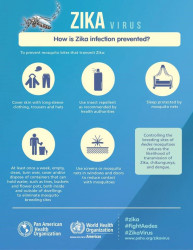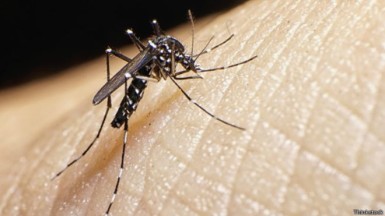In the wake of deepening worldwide concerns about the effect of the mosquito-borne Zika virus on the brain development of unborn babies, the US Centers for Dis-ease Control and Prevention (CDC) yesterday added Guyana and several other Caribbean countries to its travel advisory.
The center is asking pregnant women to avoid visiting these countries because of the presence of the virus, according to its website.
The announcement follows confirmation from U.S. authorities of the birth of a baby with a small head in Hawaii to a mother who had been infected with the Zika virus while visiting Brazil. There has been a flood of similar cases in Brazil.

It also comes after Minister of Public Health Dr. George Norton revealed that a 27-year-old local woman had tested positive for the Zika and a Pan-American Health Organisation/World Health Organisation (PAHO/ WHO) Epidemiological Update, dated January 17, 2016, which lists Guyana as one of the countries which has recorded the presence of Zika.
 Also reported is that one of three patients in the UK who have tested positive for Zika had recently travelled to Guyana. Public Health England says on its website (https:// www.gov.uk/guidance/ zika-virus) that “as of 18 January 2016, three cases associated with travel to Colombia, Suriname and Guyana have been diagnosed in UK travellers.”
Also reported is that one of three patients in the UK who have tested positive for Zika had recently travelled to Guyana. Public Health England says on its website (https:// www.gov.uk/guidance/ zika-virus) that “as of 18 January 2016, three cases associated with travel to Colombia, Suriname and Guyana have been diagnosed in UK travellers.”
The PAHO/WHO report highlights a correlation between an “increase of congenital anomalies, Guillain-Barré syndrome, and other neurological and autoimmune syndromes in areas where Zika virus is circulating.” It stresses that though the data is so far only correlative “the possible causative nature of the association cannot be ruled out with the evidence available” and a result individuals and governments are being urged to take preventative measures.
Within the Americas, Brazil has reported a growing number of cases of women delivering babies with microcephaly – incomplete brain development. PAHO notes that while the country has between 2010 and 2014, reported a yearly average of 163 microcephaly cases, there have been between October, 2015 and the first week of this year 3,530 microcephaly cases recorded. These cases include 46 deaths in 20 states and the Federal District.
The Ministry of Public Health here has said that a number of measures are being taken to address the virus, including fogging and the distribution of bed nets impregnated with chemicals which are effective against the mosquito, the Aedes species. This mosquito is also responsible for the spread of Chikungunya, Dengue Fever and Yellow Fever.
Norton had told Stabroek News last Thursday that his ministry has begun distribution of the treated nets to all ante-natal clinics in the country.
However, when Stabroek News visited several of these clinics in the Georgetown area, it learned that none of these clinics had begun distributing nets.
Health workers at one of the clinics in central Georgetown were unaware that a distribution of the nets was supposed to have been underway.
However, workers at three other clinics said that they had been contacted by the vector control unit and asked to submit statistics on the number of pregnant women registered with the clinics. This data, they were told, was to allow for them to receive the necessary quota of the nets but they had not yet received the nets.
“Every day they say they coming at 1 O’clock and every day they don’t come. It’s more than seven days since they say they coming and they haven’t reached yet,” one health worker told Stabroek News.
At the Plaisance Health Centre, Stabroek News was told that the nets are available for distribution. However, the registered mothers and pregnant women Stabroek News spoke with at the institution were yet to receive nets. In fact, they were unaware that there was a reason for them to have been issued with the nets.
There was also no evidence at any of the clinics Stabroek News visited that attempts were being made to educate expectant mothers about the virus, its effects and what can be done to prevent being infected.
There is no vaccine or treatment for Zika, which causes mild fevers and rashes. Symptoms which are displayed in only 1 in 4 of those infected.
Consequently, as the numbers of affected infants rises in Brazil, some countries have been advising women to delay pregnancies as a precaution. It was reported by several international news agencies that women in Brazil, especially north east Brazil, are being advised not to get pregnant for at least the next 6 months to a year. The Associated Press has reported that Jamaica’s Health Minister Horace Dalley has also advised women in that country “to delay plans to become pregnant for the next six to 12 months due to the mosquito-borne Zika virus.”
Similar advice is being offered to in Colombia and El Salvador. In El Salvador the Ministry of Health is advising women to avoid becoming pregnant until 2018, a pronouncement which activists have labelled naïve (http://www.reuters.com/article/us-americas-health-zika-idUSKCN0V100H).
PAHO/WHO, however, recommends its Member States strengthen antenatal care and continue with their efforts to reduce the presence of mosquitoes through an effective vector control strategy and communication to the public.









